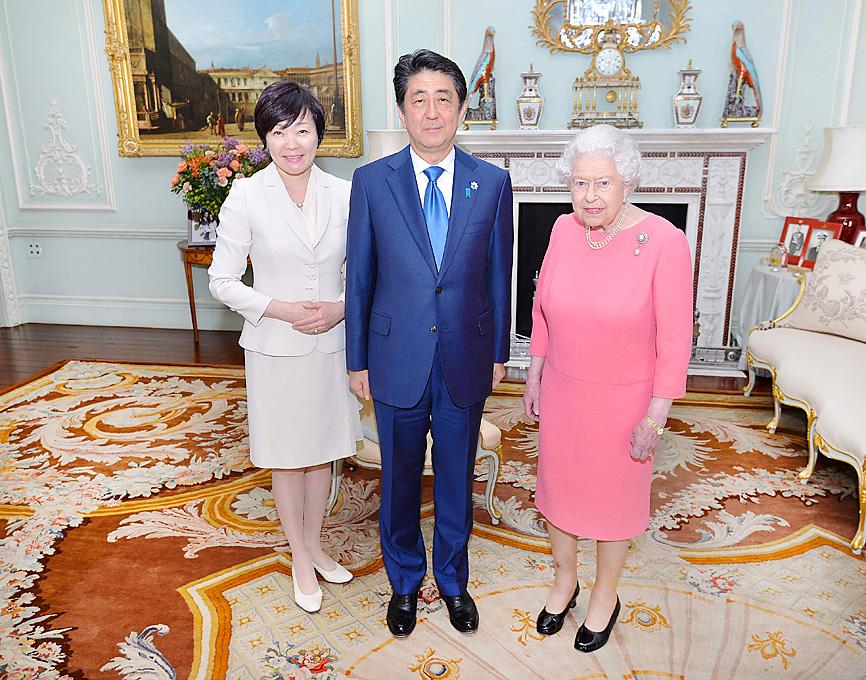Born into a prominent political family, former Japanese prime minister Shinzo Abe, who was shot dead at a campaign event in western Japan yesterday, had been the country’s longest-serving leader since World War II.
While credited with bringing a degree of stability to Japan following a period of economic malaise, Abe angered neighbors South Korea and China — along with many Japanese — with a rhetoric many deemed nationalistic and calls to revise the country’s pacifist constitution.
Abe was born in Tokyo on Sept. 21, 1954, the son of Shintaro Abe, who served as Japanese minister of foreign affairs from 1982 to 1986, and grandson of former Japanese prime minister Nobusuke Kishi.

Photo: AFP
He in 1977 graduated from Tokyo’s Seikei University with a degree in political science, after which he moved to the US to study public policy at the University of Southern California.
After returning to Japan and working in the management of a steel manufacturer for three years, he started to pursue a career at the Japanese Ministry of Foreign Affairs.
Running for the Liberal Democratic Party (LDP), he was in 1993 elected to parliament, representing the southwestern prefecture of Yamaguchi. Shinzo Abe, already viewed as a conservative at the time, was a member of the party’s Mori faction, which had once been headed by his father, who died in 1991.
Abe was in 2005 appointed Japanese chief cabinet secretary under then-Japanese prime minister Junichiro Koizumi. After leading negotiations to return Japanese abducted to North Korea, he was the same year elected head of the LDP.
On Sept. 26, 2006, he became prime minister for the first time, overseeing economic reforms while taking a hard line on North Korea and seeking to engage with South Korea and China.
Following electoral defeats that saw the LDP lose control of the legislature for the first time in 52 years, Abe in 2007 resigned as prime minister, citing health reasons.
In 2012, Abe became prime minister for a second time and a year later launched economic reforms dubbed “Abenomics.”
He served four terms, seeking closer ties with Western powers and distancing the country form China.
On Aug. 28, 2020, he announced that he would step down, again citing health reasons.
Despite leaving office, Abe in 2020 showed that he can still rile up Beijing with comments on Taiwan, warning that “military adventure would lead to economic suicide.”

The Burmese junta has said that detained former leader Aung San Suu Kyi is “in good health,” a day after her son said he has received little information about the 80-year-old’s condition and fears she could die without him knowing. In an interview in Tokyo earlier this week, Kim Aris said he had not heard from his mother in years and believes she is being held incommunicado in the capital, Naypyidaw. Aung San Suu Kyi, a Nobel Peace Prize laureate, was detained after a 2021 military coup that ousted her elected civilian government and sparked a civil war. She is serving a

‘NO AMNESTY’: Tens of thousands of people joined the rally against a bill that would slash the former president’s prison term; President Lula has said he would veto the bill Tens of thousands of Brazilians on Sunday demonstrated against a bill that advanced in Congress this week that would reduce the time former president Jair Bolsonaro spends behind bars following his sentence of more than 27 years for attempting a coup. Protests took place in the capital, Brasilia, and in other major cities across the nation, including Sao Paulo, Florianopolis, Salvador and Recife. On Copacabana’s boardwalk in Rio de Janeiro, crowds composed of left-wing voters chanted “No amnesty” and “Out with Hugo Motta,” a reference to the speaker of the lower house, which approved the bill on Wednesday last week. It is

‘EAST SHIELD’: State-run Belma said it would produce up to 6 million mines to lay along Poland’s 800km eastern border, and sell excess to nations bordering Russia and Belarus Poland has decided to start producing anti-personnel mines for the first time since the Cold War, and plans to deploy them along its eastern border and might export them to Ukraine, the deputy defense minister said. Joining a broader regional shift that has seen almost all European countries bordering Russia, with the exception of Norway, announce plans to quit the global treaty banning such weapons, Poland wants to use anti-personnel mines to beef up its borders with Belarus and Russia. “We are interested in large quantities as soon as possible,” Deputy Minister of National Defense Pawel Zalewski said. The mines would be part

Cozy knits, sparkly bobbles and Santa hats were all the canine rage on Sunday, as hundreds of sausage dogs and their owners converged on central London for an annual parade and get-together. The dachshunds’ gathering in London’s Hyde Park came after a previous “Sausage Walk” planned for Halloween had to be postponed, because it had become so popular organizers needed to apply for an events licence. “It was going to be too much fun so they canceled it,” laughed Nicky Bailey, the owner of three sausage dogs: Una and her two 19-week-old puppies Ember and Finnegan, wearing matching red coats and silver